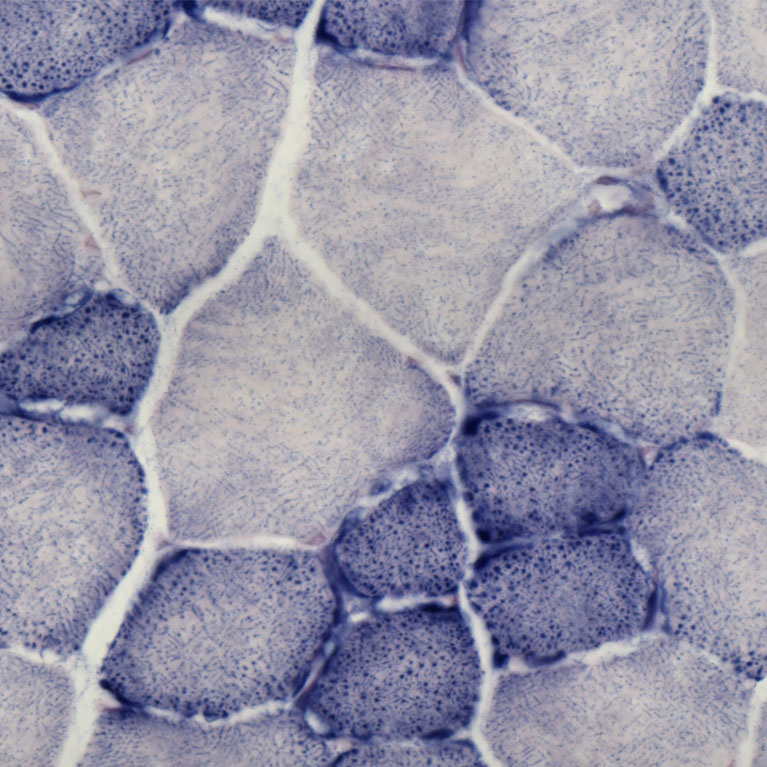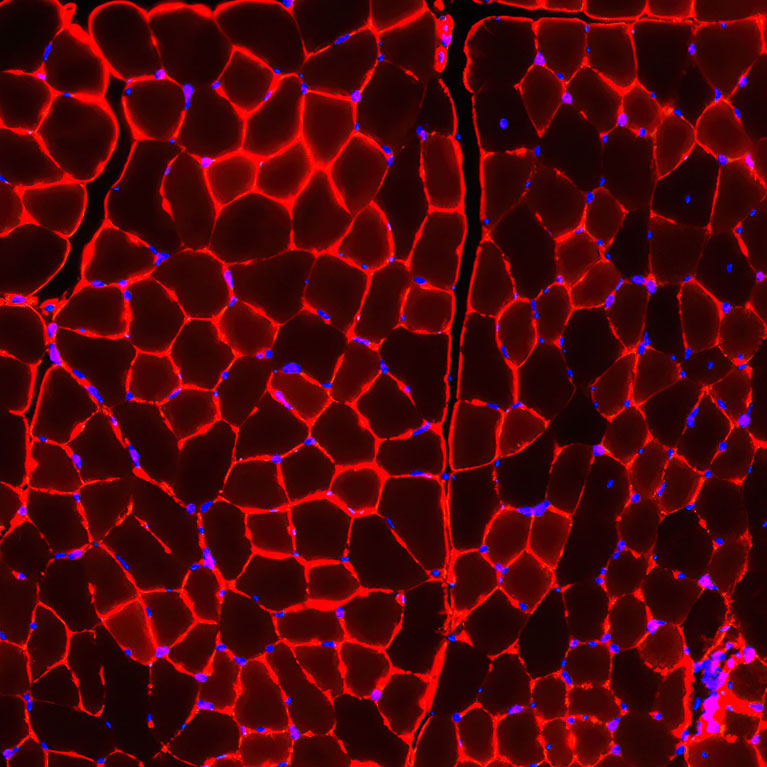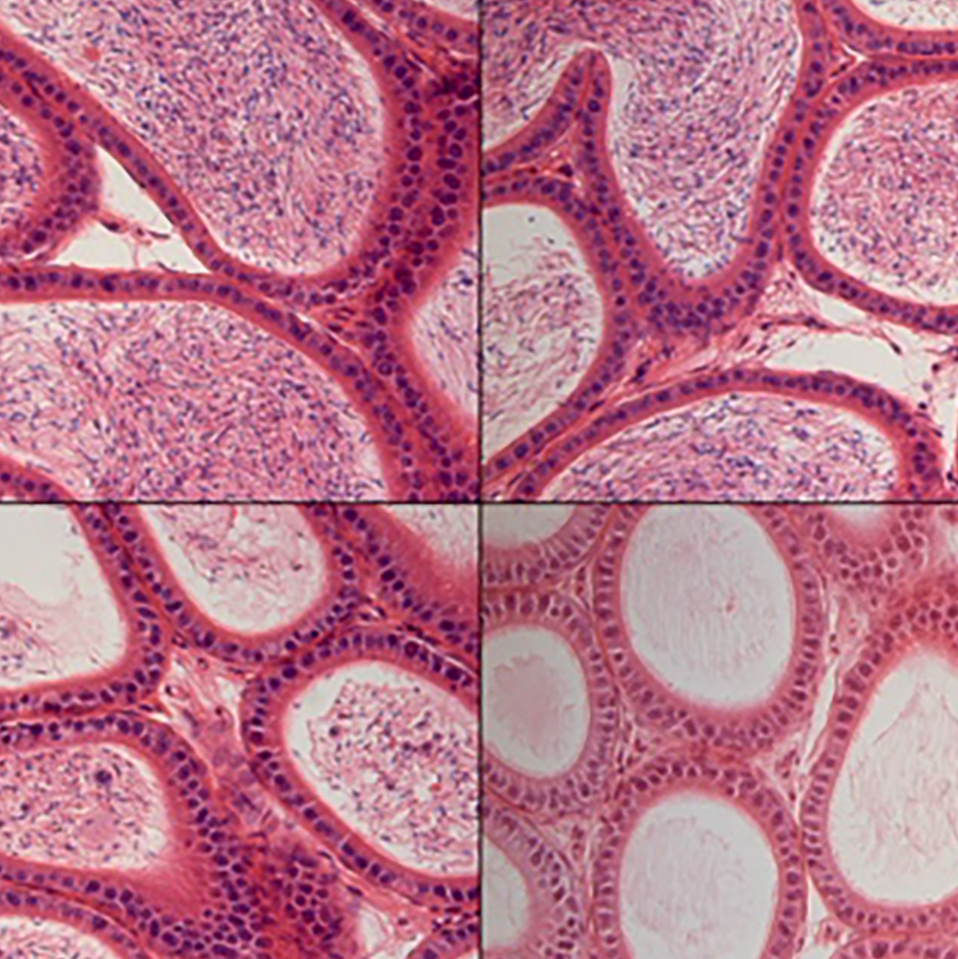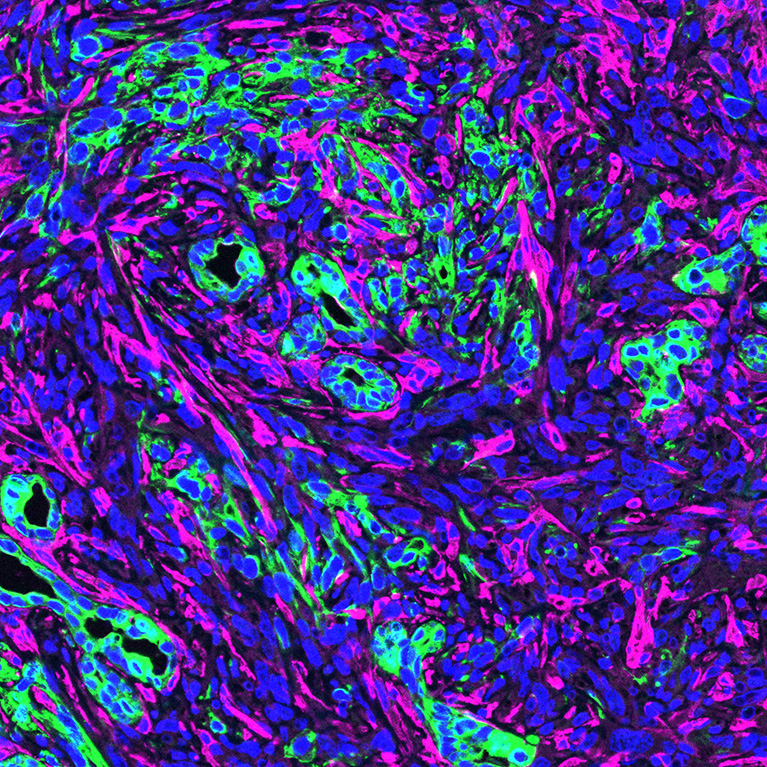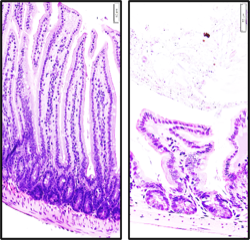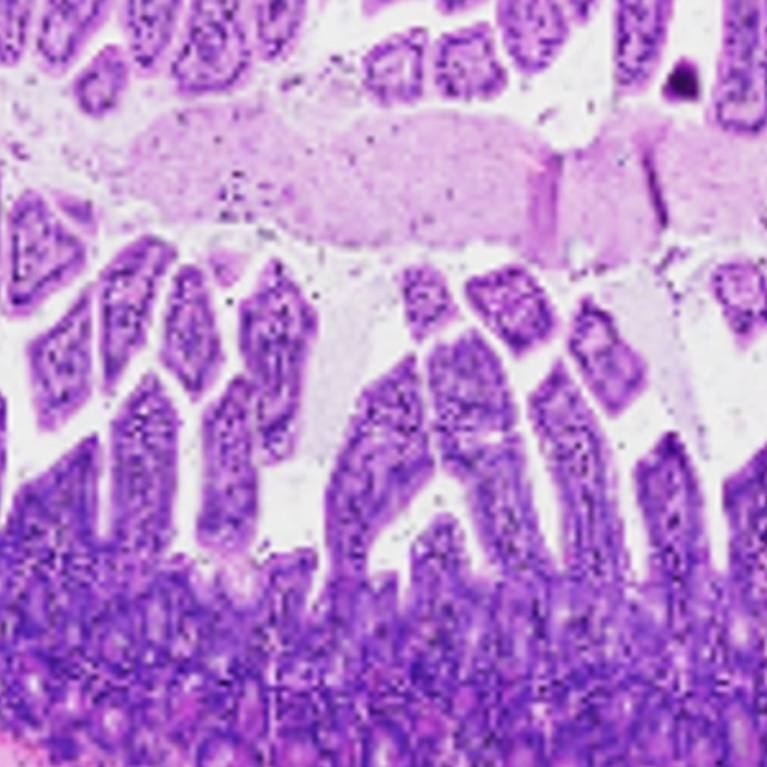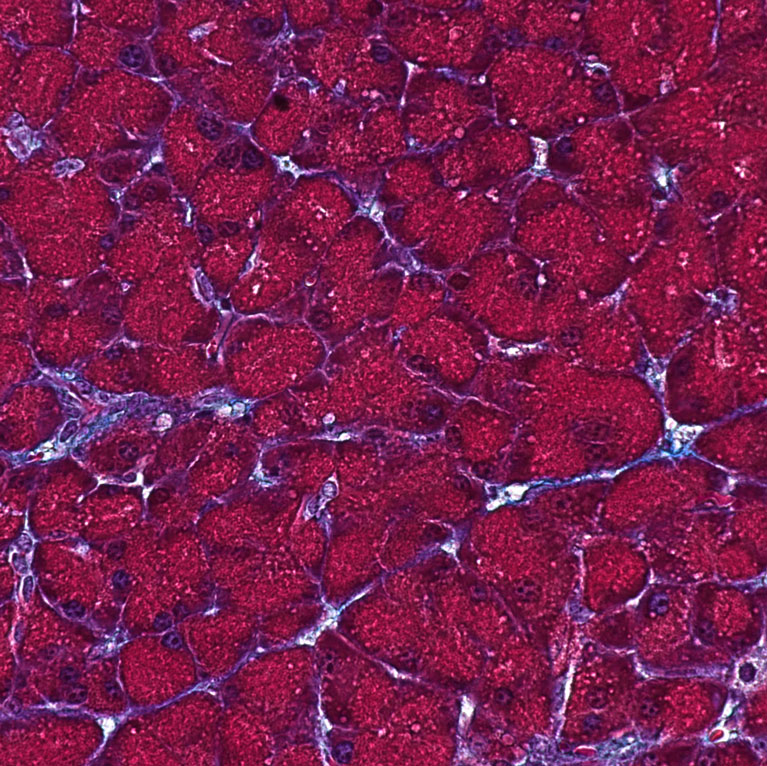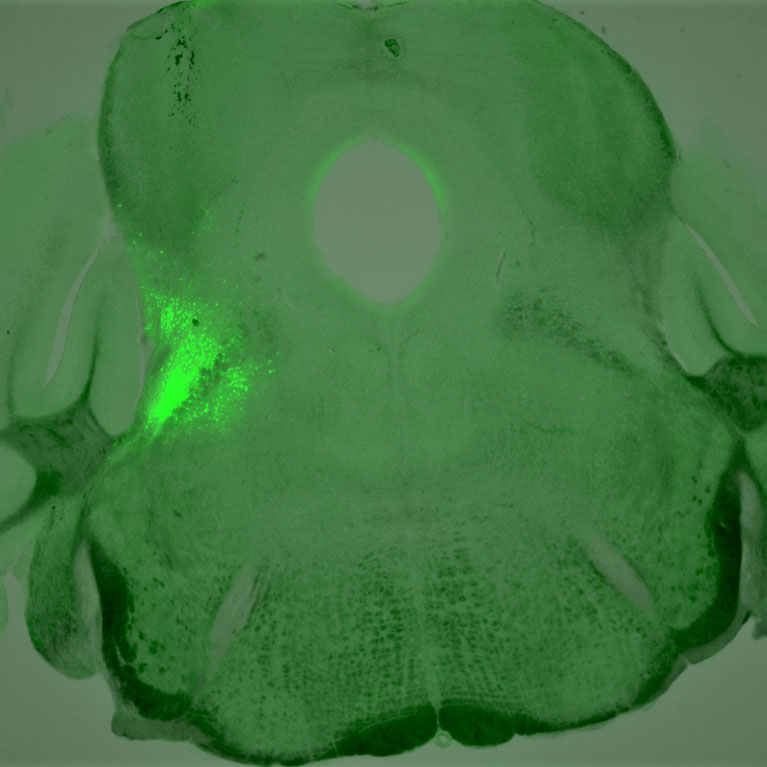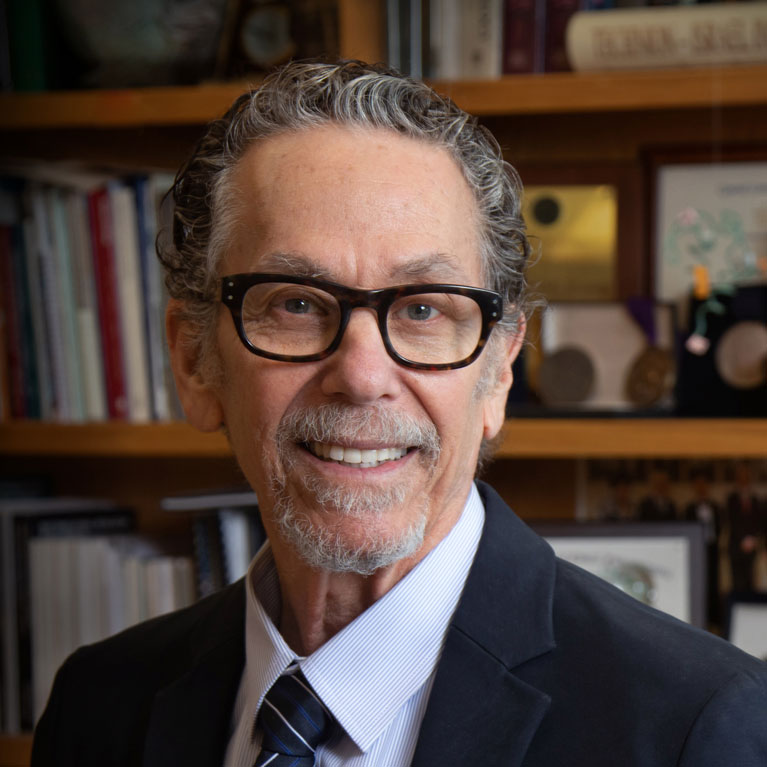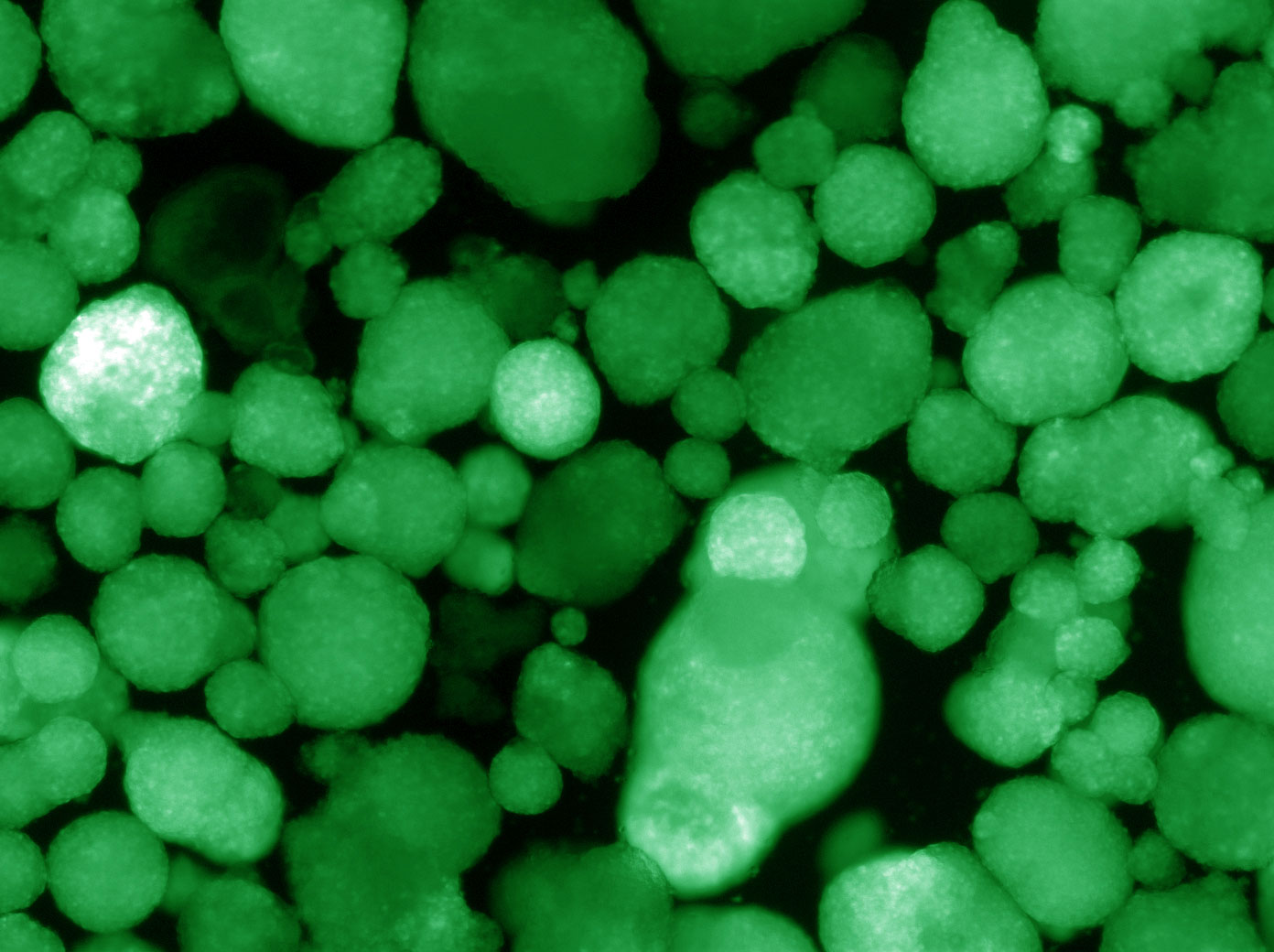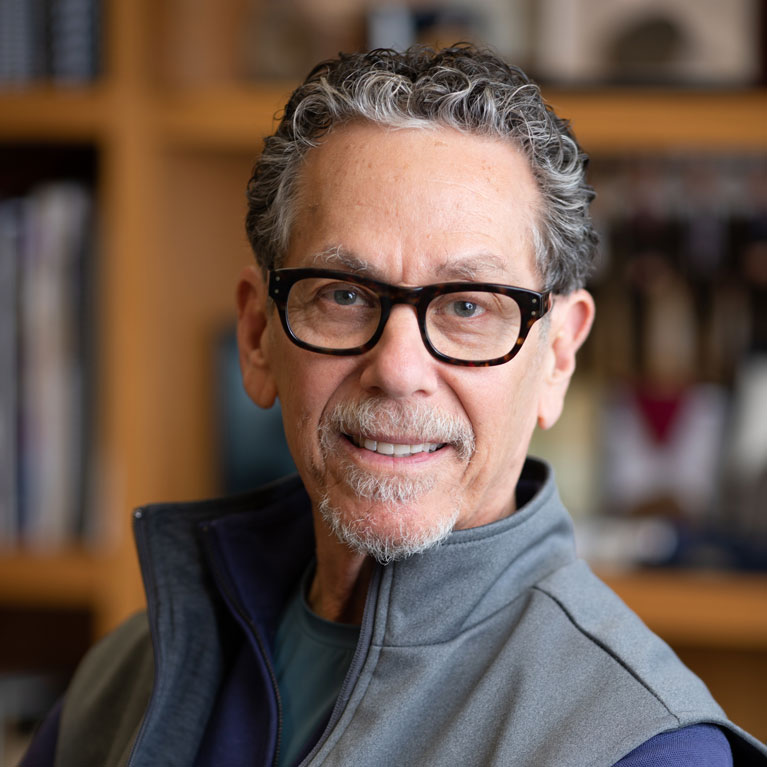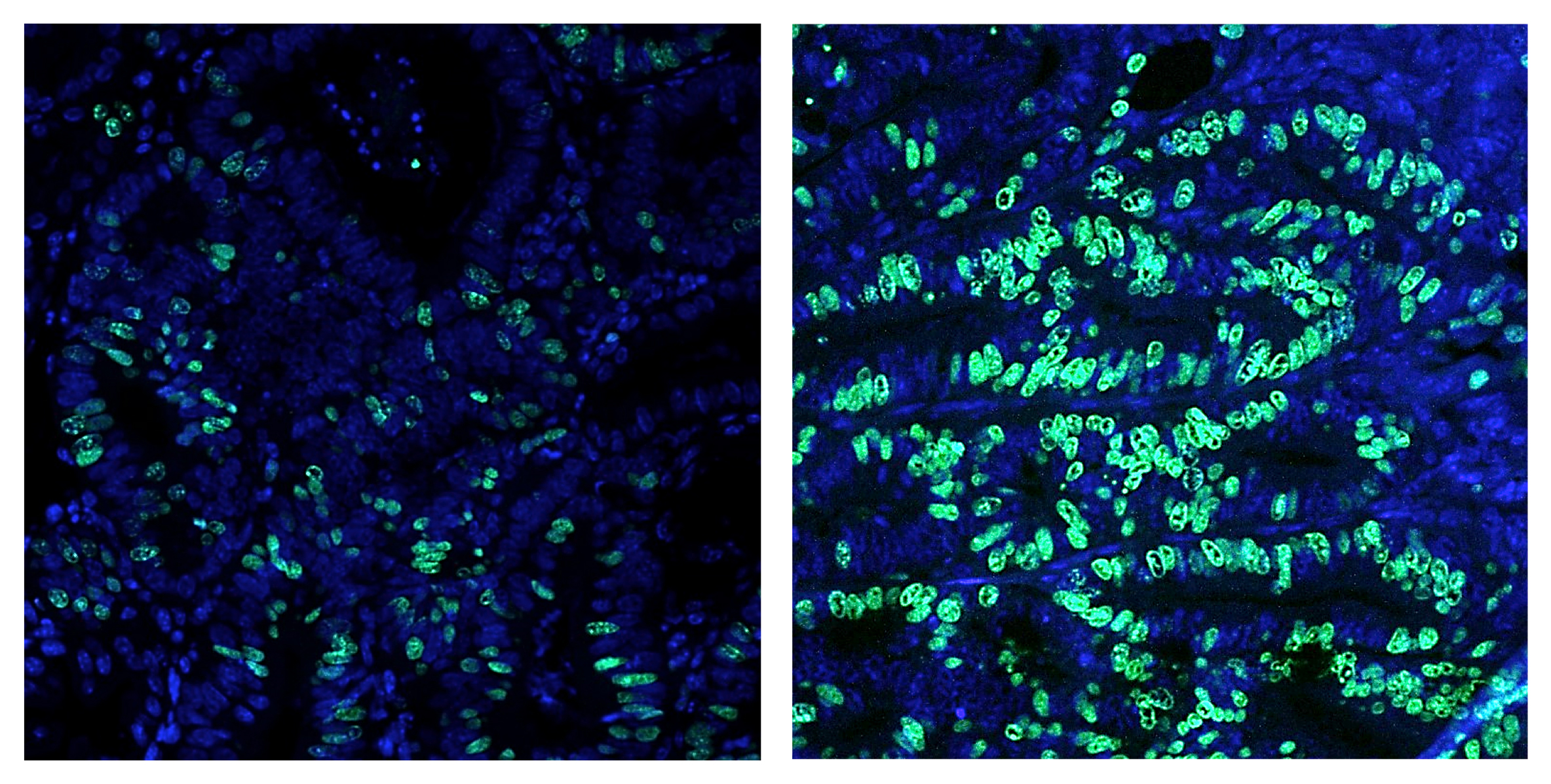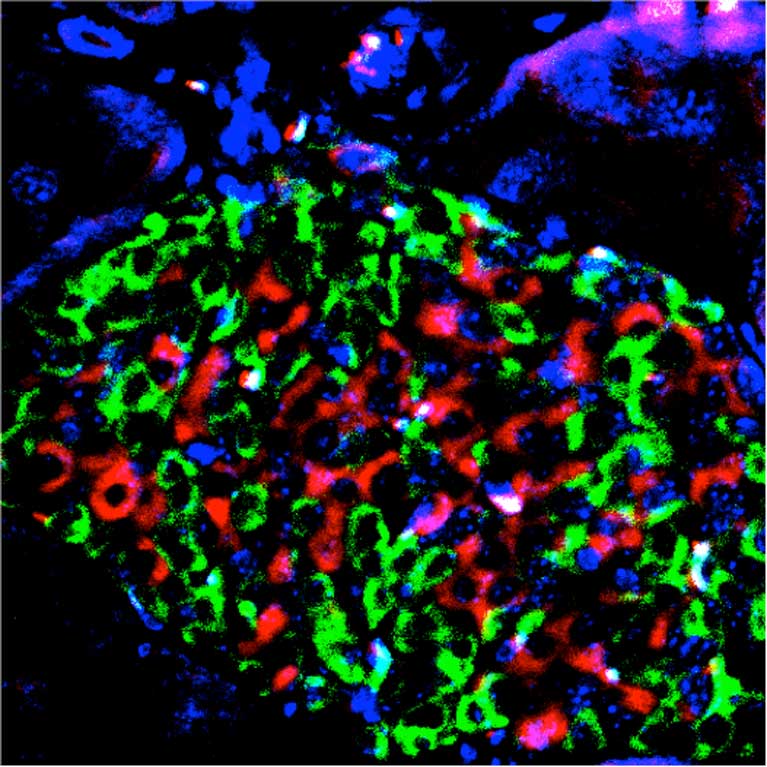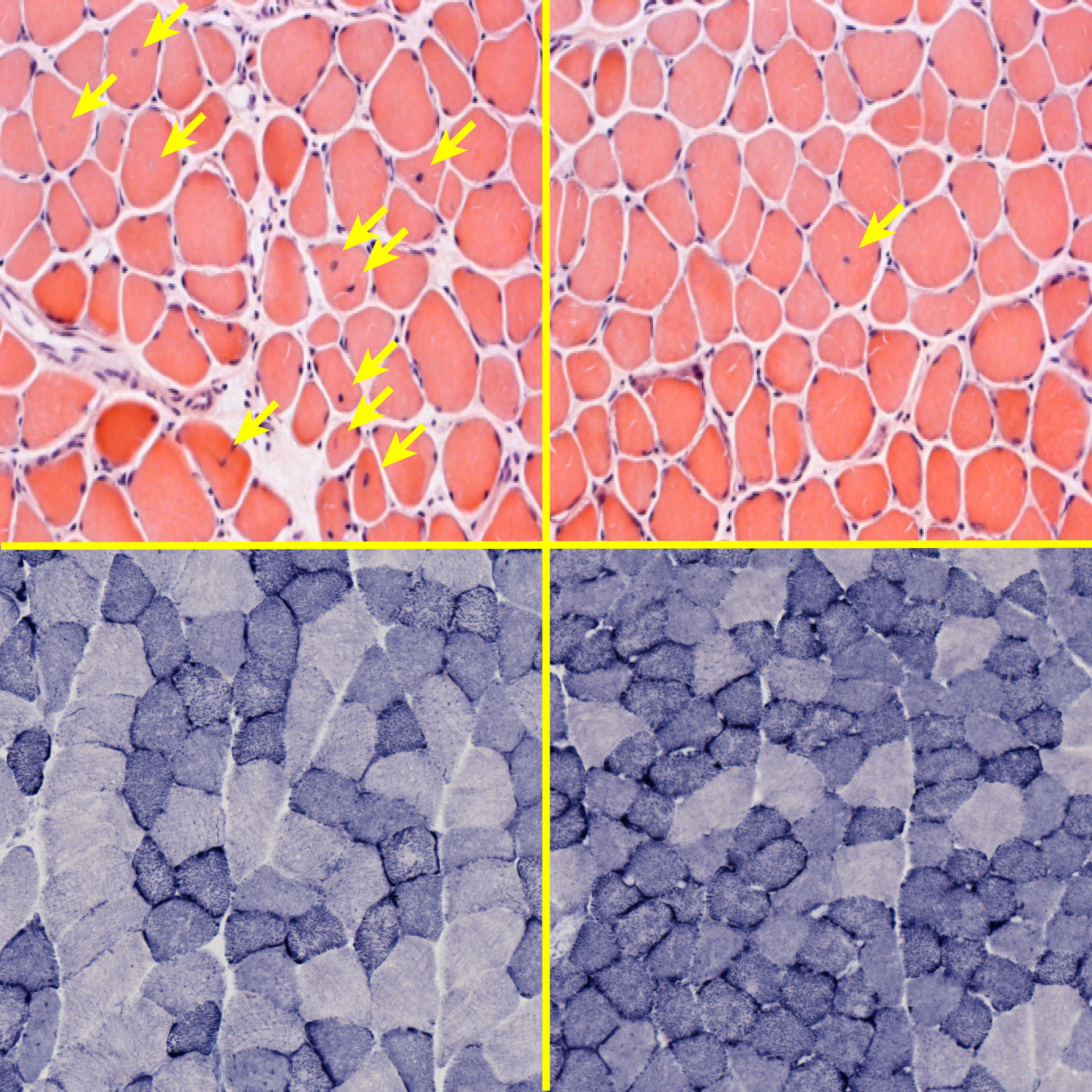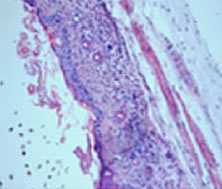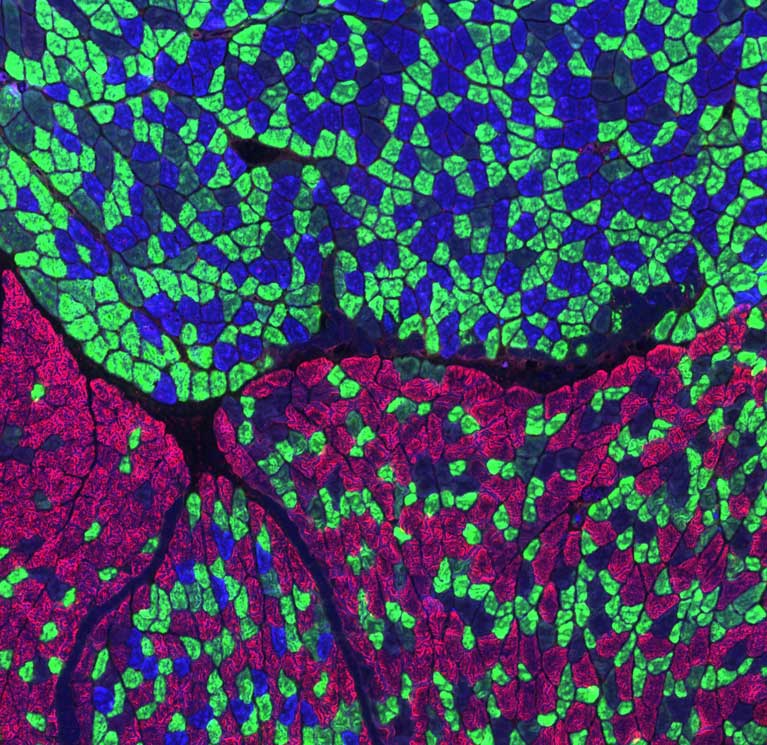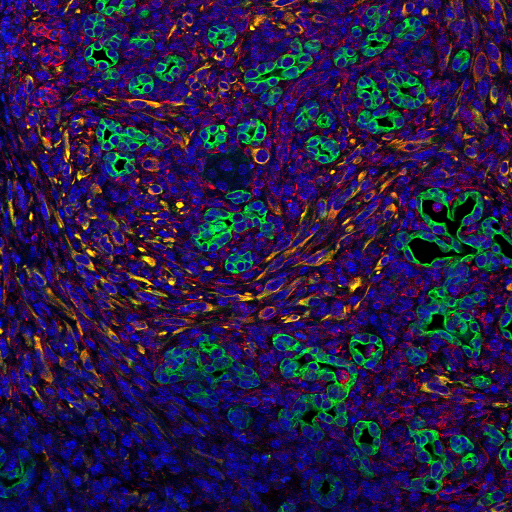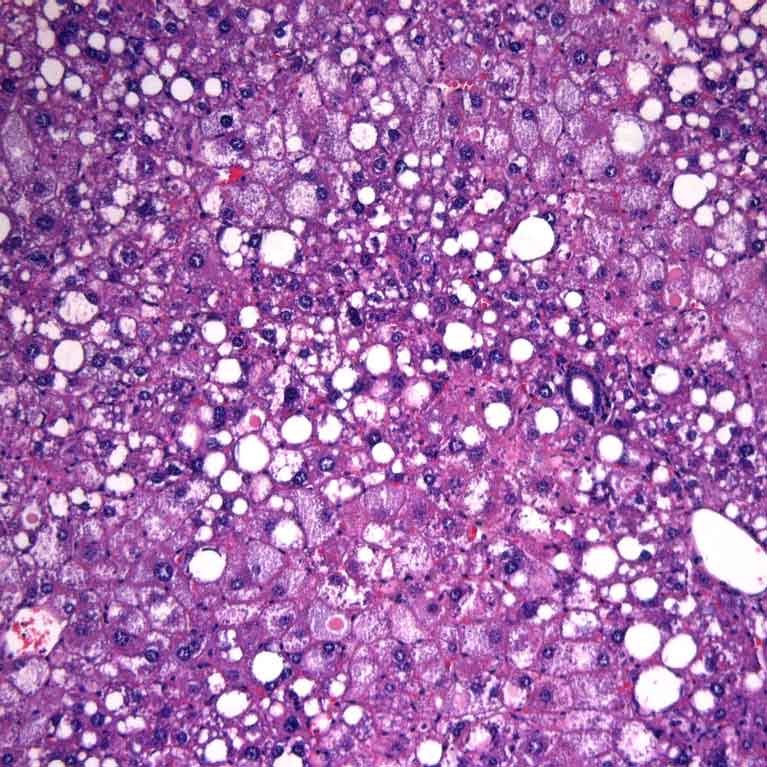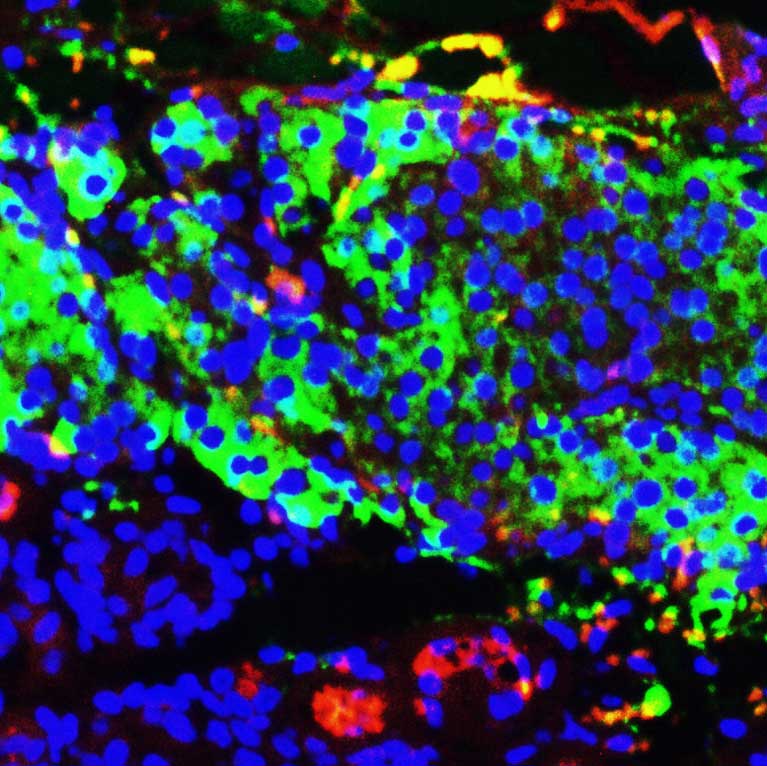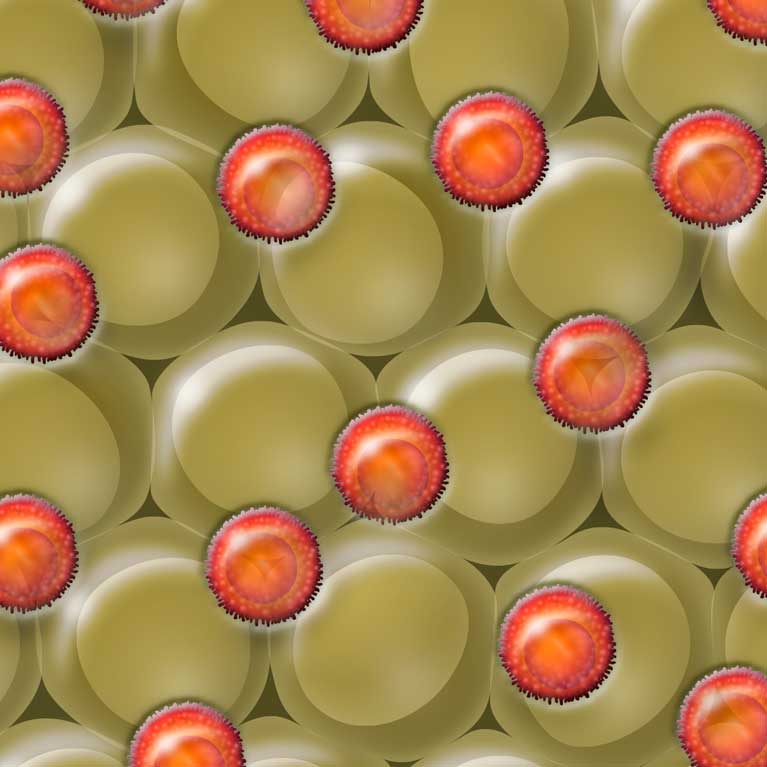Press
Eight Salk scientists named among the most Highly Cited Researchers in the world
LA JOLLA—Salk faculty members Joseph Ecker, PhD, Ronald Evans, PhD, Rusty Gage, PhD, Christian Metallo, PhD, Satchidananda Panda, PhD, Reuben Shaw, PhD, and Kay Tye, PhD, as well as research assistant Joseph Nery have all been named in this year’s Highly Cited Researchers list by Clarivate. The 2025 list includes 6,868 researchers from 60 countries who have demonstrated “significant and broad influence in their fields of research.”
Estrogen-related receptors could be key to treating metabolic and muscular disorders
LA JOLLA—A new Salk Institute study suggests estrogen-related receptors could be a key to repairing energy metabolism and muscle fatigue.
Boosting this molecule could help retain muscle while losing fat
LA JOLLA—About one in eight adults in the United States has tried or currently uses a GLP-1 medication, and a quarter of those users cite weight loss as their main goal. But weight loss doesn’t discriminate between fat and muscle. Patients using GLP-1 drugs can experience rapid and substantial muscle loss, accounting for as much as 40% of their total weight loss. So how can we lose weight without also losing critical muscle?
Seven Salk scientists named among most highly cited researchers in the world
LA JOLLA—Salk Professors Joseph Ecker, Ronald Evans, Rusty Gage, Satchidananda Panda, Reuben Shaw, and Kay Tye, as well as research assistant Joseph Nery, have all been named to the Highly Cited Researchers list by Clarivate. The 2024 list includes 6,636 researchers from 59 countries who have demonstrated “significant and broad influence in their fields of research,” as reflected by their publication of multiple papers over the past decade that rank in the top 1% by citations for their fields.
Salk Institute receives $5 million gift from Paul M. Angell Foundation to develop pancreatic cancer diagnostics and therapies
LA JOLLA—The Salk Institute will receive a four-year, $5 million gift from the Paul M. Angell Family Foundation to support pancreatic cancer research. The project’s leaders, Salk Assistant Professor Dannielle Engle, Professor Ronald Evans, and Professor Reuben Shaw, will establish a novel pipeline from patients to the laboratory and back to the clinic. The approach will provide a unique opportunity to uncover new diagnostics and therapies for pancreatic cancer.
Salk scientists discover new target for reversible, non-hormonal male birth control
LA JOLLA—Surveys show most men in the United States are interested in using male contraceptives, yet their options remain limited to unreliable condoms or invasive vasectomies. Recent attempts to develop drugs that block sperm production, maturation, or fertilization have had limited success, providing incomplete protection or severe side effects. New approaches to male contraception are needed, but because sperm development is so complex, researchers have struggled to identify parts of the process that can be safely and effectively tinkered with.
Salk Institute Professor Ronald Evans honored with Japan Prize
LA JOLLA—Salk Professor Ronald Evans has been named the 2024 recipient of the Japan Prize in the field of Medical Science and Pharmaceutical Science. The Japan Prize Foundation awards this prestigious international award annually to “express Japan’s gratitude to international society.”
How drugs can target the thick “scar tissue” of pancreatic cancer
LA JOLLA—Pancreatic cancer is one of the deadliest cancers—only about one in eight patients survives five years after diagnosis. Those dismal statistics are in part due to the thick, nearly impenetrable wall of fibrosis, or scar tissue, that surrounds most pancreatic tumors and makes it hard for drugs to access and destroy the cancer cells.
Seven Salk scientists named among best and most highly cited researchers in the world
LA JOLLA—Salk Professors Joseph Ecker, Ronald Evans, Satchidananda Panda, Rusty Gage, and Kay Tye, as well as Assistant Professor Jesse Dixon, have been named to the Highly Cited Researchers list by Clarivate. The 2023 list includes 6,849 researchers from 67 countries, all of whom demonstrate “significant and broad influence reflected in their publication of multiple highly cited papers over the last decade.” This is the ninth consecutive year that Ecker and Gage have made the list. Joseph Nery, a research assistant II in the Ecker lab, was also included on the list.
“Super-enhancer” super-charges pancreatic tumor growth
LA JOLLA—Pancreatic cancers are among the most aggressive, deadly tumor types and, for years, researchers have struggled to develop effective drugs against the tumors. Now, Salk researchers have identified a new set of molecules that fuel the growth of tumors in pancreatic ductal adenocarcinoma (PDAC), the most common type of pancreatic cancer.
High-fat diets alter gut bacteria, boosting colorectal cancer risk in mice
LA JOLLA—The prevalence of colorectal cancer in people under the age of 50 has risen in recent decades. One suspected reason: the increasing rate of obesity and high-fat diets. Now, researchers at the Salk Institute and UC San Diego have discovered how high-fat diets can change gut bacteria and alter digestive molecules called bile acids that are modified by those bacteria, predisposing mice to colorectal cancer.
Salk scientists receive $1.5 million from Sol Goldman Charitable Trust to research multiple sclerosis treatments
LA JOLLA—Salk Professor Ronald Evans and an interdisciplinary group of Institute researchers have been awarded a two-year, $1.5 million grant from the Sol Goldman Charitable Trust at the direction of cardiologist and Salk Trustee Benjamin Lewis. The award will fund a research project to explore connections between the gut, brain, and immune system in search of new therapies for patients with multiple sclerosis (MS).
Salk scientists develop compound that reverses gut inflammation in mice
LA JOLLA—A drug developed by Salk Institute researchers acts like a master reset switch in the intestines. The compound, called FexD, has previously been found to lower cholesterol, burn fat, and ward off colorectal cancer in mice. Now, the team reports in Proceedings of the National Academy of Sciences on December 12, 2022, that FexD can also prevent and reverse intestinal inflammation in mouse models of inflammatory bowel disease.
Ten Salk professors named among best and most highly cited researchers in the world
LA JOLLA—Salk Professors Joseph Ecker, Ronald Evans, Rusty Gage, Christian Metallo, Satchidananda Panda, Reuben Shaw, and Kay Tye, along with Assistant Professor Jesse Dixon, have been named to the Highly Cited Researchers list by Clarivate. This year’s list includes 6,938 researchers from 69 countries and identifies researchers who demonstrate “significant influence in their chosen field or fields through the publication of multiple highly cited papers.” Ecker and Gage have been named to this list every year since 2014, when the regular annual rankings began. Joseph Nery, a research assistant II in the Ecker lab, was also included on the list.
The protein that keeps the pancreas from digesting itself
LA JOLLA—Every day, your pancreas produces about one cup of digestive juices, a mixture of molecules that can break down the food you eat. But if these powerful molecules become activated before they make their way to the gut, they can damage the pancreas itself—digesting the very cells that created them, leading to the painful inflammation known as pancreatitis, and predisposing a person to pancreatic cancer.
How obesity can rewire the immune system and the response to immunotherapy—and how to change that
LA JOLLA—When mice with atopic dermatitis—a common type of allergic skin inflammation—are treated with drugs that target the immune system, their thickened, itchy skin generally heals quickly. But scientists have now discovered that the same treatment in obese mice makes their skin worse, instead. That is because obesity changes the molecular underpinnings of allergic inflammation, both in mice and humans.
The Lustgarten Foundation and Salk Institute announce strategic pancreatic cancer research partnership
LA JOLLA/NEW YORK—The Lustgarten Foundation and Salk Institute today announced a new strategic partnership supported by a $5 million grant and focused on identifying and validating potential targets for new pancreatic cancer drugs. The effort will be led by four co-principal investigators, all prominent cancer researchers in the Salk Dedicated Program in Pancreatic Cancer: Professors Reuben Shaw, Ronald Evans, Tony Hunter and Assistant Professor Dannielle Engle. The partnership is part of the Lustgarten Advancing Breakthrough Science (LABS) Program.
Salk Professor Ronald Evans awarded $1.2 million by Larry L. Hillblom Foundation to study a new druggable pathway that could help treat diabetes
LA JOLLA—Professor Ronald Evans will receive $1.2 million over four years as part of a Network Grant from the Larry L. Hillblom Foundation to examine a molecular pathway that regulates blood sugar and fat independent of insulin. The research will advance our understanding of type 2 diabetes and could lead to the development of new therapies for treating the disease. Other members of the team include Professors Jin Zhang and Alan Saltiel from the University of California San Diego.
Salk researchers find a new route for regulating blood sugar levels independent of insulin
LA JOLLA—The discovery of insulin 100 years ago opened a door that would lead to life and hope for millions of people with diabetes. Ever since then, insulin, produced in the pancreas, has been considered the primary means of treating conditions characterized by high blood sugar (glucose), such as diabetes. Now, Salk scientists have discovered a second molecule, produced in fat tissue, that, like insulin, also potently and rapidly regulates blood glucose. Their finding could lead to the development of new therapies for treating diabetes, and also lays the foundation for promising new avenues in metabolism research.
Salk scientists receive the 2021 ASPIRE award to study pancreatic cancer
LA JOLLA—Professor Ronald Evans and Assistant Professor Dannielle Engle have been granted a 2021 ASPIRE (Accelerating Scientific Platforms and Innovative Research) award to study the cellular and molecular drivers of pancreatic cancer, one of the deadliest cancers with few effective treatment options. The $250,000 award, supported by the Mark Foundation for Cancer Research, enables innovative approaches to solving impactful problems in cancer research. The 23 scientists chosen to lead 2021 ASPIRE projects represent disciplines across the spectrum of cancer research at top academic institutions worldwide.
Researchers identify neurons involved in overdose deaths
LA JOLLA—It’s long been known that opioid overdose deaths are caused by disrupted breathing, but the actual mechanism by which these drugs suppress respiration was not understood. Now, a new study by Salk scientists has identified a group of neurons in the brainstem that plays a key role in this process.
Salk scientist Ronald Evans receives 2021 Asan Award in Basic Medicine
LA JOLLA—Salk Professor Ronald Evans, director of Salk’s Gene Expression Laboratory and March of Dimes Chair in Molecular and Developmental Biology, has been awarded the 2021 Asan Award in Basic Medicine by the Asan Foundation.
First immune-evading cells created to treat type 1 diabetes
LA JOLLA—Salk Institute scientists have made a major advance in the pursuit of a safe and effective treatment for type 1 diabetes, an illness that impacts an estimated 1.6 million Americans with a cost of $14.4 billion annually.
Giant leap in diagnosing liver disease
LA JOLLA—Chronic liver disease represents a major global public health problem affecting an estimated 844 million people, according to the World Health Organization. It is among the top causes of mortality in Australia, the UK and the United States. At the same time, it is both difficult to manage and there is no FDA-approved anti-fibrotic liver therapy. The microbiome—a complex collection of microbes that inhabit the gut—may be an unexpected indictor of health. Now, a collaborative team of Salk Institute and UC San Diego scientists have created a novel microbiome-based diagnostic tool that, with the accuracy of the best physicians, quickly and inexpensively identifies liver fibrosis and cirrhosis over 90 percent of the time in human patients.
Salk scientist Ronald Evans receives a 2020 NOMIS Distinguished Scientist Award
LA JOLLA—Salk Professor Ronald Evans, Howard Hughes Medical investigator and director of Salk’s Gene Expression Laboratory, has been awarded a 2020 NOMIS Distinguished Scientist and Scholar Award by the NOMIS Foundation, a Swiss foundation that supports high-risk basic research. The award, which totals $2.5M, recognizes scientists for their “outstanding contributions to the advancement of science and human progress through their pioneering, innovative and collaborative research,” according to NOMIS. The award will enable Evans to decode how different parts of the body, including the brain, endocrine glands, gut, liver, immune cells and the microbiome, cooperate to maintain health.
Eight Salk professors named among most highly cited researchers in the world
LA JOLLA—Salk Professors Joanne Chory, Joseph Ecker, Ronald Evans, Rusty Gage, Juan Carlos Izpisua Belmonte, Terrence Sejnowski, Reuben Shaw and Kay Tye have been named to the Highly Cited Researchers list by Clarivate Analytics. The list selects researchers for demonstrating “significant and broad influence” reflected by the production of multiple highly cited papers that rank in the top 1 percent by citations for field and year.
Salk scientists uncover how high-fat diets drive colorectal cancer growth
LA JOLLA—As cancer death rates drop overall, doctors have noted a frightening anomaly: deaths from colorectal cancer in people under 55 appear to be creeping up. According to the American Cancer Society, deaths in this younger group increased by 1 percent between 2007 and 2016.
Salk scientist Ronald Evans named 2018 AAAS Fellow
LA JOLLA—Salk Professor and Howard Hughes Medical Investigator Ronald Evans, who is also director of Salk’s Gene Expression Laboratory, has been a named a 2018 Fellow of the American Association for the Advancement of Science (AAAS), the world’s largest general scientific society. In particular, the AAAS acknowledges his discoveries on steroid and orphan receptor signaling, revealing a “treasure trove” of both known and novel branches of physiology, metabolism and disease, according to the citation.
$1.6 Million CIRM grant supports potential diabetes treatment
LA JOLLA—Approximately 1.25 million Americans are living with type 1 diabetes (T1D), with an additional 40,000 people newly diagnosed every year. T1D is an autoimmune disease that destroys insulin-producing pancreatic islet cells. Insulin is a hormone that allows sugar (glucose) to enter cells to produce energy. Without insulin, blood sugar accumulates, causing toxic side effects. Despite active research, T1D has no cure. While treatments, including daily insulin injections, are available, managing the disease remains challenging, and poorly controlled T1D can lead to blindness, organ failure and other health issues.
Salk researchers win five competitive grants for cancer research
LA JOLLA—Salk Institute scientists Ronald Evans, Diana Hargreaves, Tony Hunter, Graham McVicker and Geoffrey Wahl are among the first wave of researchers to receive funding from Padres Pedal the Cause, one of one of the largest stand-alone cancer fundraising events in San Diego. The nonprofit raised $2.4 million for cancer research in November 2017, thanks to the efforts of more than 3,000 bicycle riders, sponsors, volunteers and donors.
Boosting the effects of Vitamin D to tackle diabetes
LA JOLLA—More than 27 million people in the United States are living with type 2 diabetes, according to the Centers for Disease Control and Prevention. As the population ages and a growing percentage of people become overweight or obese, that number is expected to increase.
Salk Institute launches Conquering Cancer Initiative
LA JOLLA—On Friday, April 20, 2018, the Salk Institute launched a new initiative called Conquering Cancer, to harness specific and emerging scientific strategies to tackle the five deadliest cancers: pancreatic, ovarian, lung, brain (glioblastoma) and triple-negative breast.
Molecule that gives energy-burning brown fat its identity could lead to drugs for obesity
LA JOLLA—While most fat cells in the human body store energy, everyone has a small subset of brown fat cells that do the opposite—burn energy and generate heat. Now, Salk researchers have discovered how the molecule ERRγ gives this “healthier” brown fat its energy-expending identity, making those cells ready to warm you up when you step into the cold, and potentially offering a new therapeutic target for diseases related to obesity. The paper appears in Cell Reports on March 13, 2018.
Salk scientists find power switch for muscles
LA JOLLA—If you’ve ever wondered how strenuous exercise translates into better endurance, researchers at the Salk Institute may have your answer. In a study published in the journal Cell Reports on March 6, 2018, scientists in Ronald Evans’ lab have shown that the protein ERRγ (ERR gamma) helps deliver many of the benefits associated with endurance exercise.
Immune cell policing offers insights into cancer, autoimmune disease
LA JOLLA—Regulatory T cells (Tregs) are the traffic cops of the immune system. They instruct other types of immune cells on when to stop and when to go. Learning how to direct the activity of Tregs has important implications for improving cancer immunotherapy as well as developing better treatments for autoimmune diseases such as rheumatoid arthritis and type 1 diabetes.
Salk researchers awarded $2.5 million for innovative pancreatic cancer clinical trial
LA JOLLA—Salk Professor and HHMI Investigator Ronald Evans has been awarded $2.5 million by Stand Up To Cancer (SU2C) as part of a multi-institution team to conduct clinical studies to open up a new avenue for immunotherapy in the treatment of pancreatic cancer. While the cancer normally excludes immune T-cells, the Evans lab discovered that modified vitamin D reprograms the cancer environment in a way that may allow the Merck drug Keytruda® to invade and destroy the tumor.
“Exercise-in-a-pill” boosts athletic endurance by 70 percent
LA JOLLA—Every week, there seems to be another story about the health benefits of running. That’s great—but what if you can’t run? For the elderly, obese or otherwise mobility-limited, the rewards of aerobic exercise have long been out of reach.
Pancreatic tumors rely on signals from surrounding cells
LA JOLLA—Just as an invasive weed might need nutrient-rich soil and water to grow, many cancers rely on the right surroundings in the body to thrive. A tumor’s microenvironment—the nearby tissues, immune cells, blood vessels and extracellular matrix—has long been known to play a role in the tumor’s growth.
Powering up the circadian rhythm
LA JOLLA—At noon every day, levels of genes and proteins throughout your body are drastically different than they are at midnight. Disruptions to this 24-hour cycle of physiological activity are why jet lag or a bad night’s sleep can alter your appetite and sleep patterns for days—and even contribute to conditions like heart disease, sleep disorders and cancers.
Salk scientists find “secret sauce” for personalized, functional insulin-producing cells
LA JOLLA—Salk scientists have solved a longstanding problem in the effort to create replacement cells for diabetic patients. The team uncovered a hidden energy switch that, when flipped, powers up pancreatic cells to respond to glucose, a step that eluded previous research. The result is the production of hundreds of millions of lab-produced human beta cells—able to relieve diabetes in mice.
Fighting liver fibrosis, the wound that never heals
LA JOLLA—Chronic damage to the liver eventually creates a wound that never heals. This condition, called fibrosis, gradually replaces normal liver cells—which detoxify the food and liquid we consume—with more and more scar tissue until the organ no longer works.
Blocking immune cell treats new type of age-related diabetes
LA JOLLA—Diabetes is often the result of obesity and poor diet choices, but for some older adults the disease might simply be a consequence of aging. New research has discovered that diabetes—or insulin resistance—in aged, lean mice has a different cellular cause than the diabetes that results from weight gain (type 2). And the findings point toward a possible cure for what the co-leading scientists, Ronald Evans and Ye Zheng, are now calling a new kind of diabetes (type 4).
Salk professor Ron Evans to co-lead ‘Dream Team’ of pancreatic cancer researchers from US, UK
LA JOLLA, CA—The Salk Institute will co-lead a new transatlantic ‘Dream Team’ of researchers that will launch a fresh attack on pancreatic cancer, one of the deadliest forms of cancer on both sides of the Atlantic. Stand Up To Cancer (SU2C), Cancer Research UK, and The Lustgarten Foundation selected the team and will provide $12 million in funding over three years.
A high-fat diet may alleviate mitochondrial disease
LA JOLLA–Mice that have a genetic version of mitochondrial disease can easily be mistaken for much older animals by the time they are nine months old: they have thinning grey hair, osteoporosis, poor hearing, infertility, heart problems and have lost weight. Despite having this disease at birth, these mice have a “secret weapon” in their youth that staves off signs of aging for a time.
Food for thought: Master protein enhances learning and memory
LA JOLLA–Just as some people seem built to run marathons and have an easier time going for miles without tiring, others are born with a knack for memorizing things, from times tables to trivia facts. These two skills–running and memorizing–are not so different as it turns out.
“Imaginary meal” tricks the body into losing weight
LA JOLLA–Salk researchers have developed an entirely new type of pill that tricks the body into thinking it has consumed calories, causing it to burn fat. The compound effectively stopped weight gain, lowered cholesterol, controlled blood sugar and minimized inflammation in mice, making it an excellent candidate for a rapid transition into human clinical trials.
Modified vitamin D shows promise as treatment for pancreatic cancer
LA JOLLA–A synthetic derivative of vitamin D was found by Salk Institute researchers to collapse the barrier of cells shielding pancreatic tumors, making this seemingly impenetrable cancer much more susceptible to therapeutic drugs.
One injection stops diabetes in its tracks
LA JOLLA—In mice with diet-induced diabetes—the equivalent of type 2 diabetes in humans—a single injection of the protein FGF1 is enough to restore blood sugar levels to a healthy range for more than two days. The discovery by Salk scientists, published today in the journal Nature, could lead to a new generation of safer, more effective diabetes drugs.
Salk professor named grantee in new pancreatic cancer research program
LA JOLLA—Ronald M. Evans, director of the Gene Expression Laboratory at Salk and Howard Hughes Medical Institute investigator, is one of three scientists chosen to receive $5 million in research funding as part of The Lustgarten Foundation’s new “Distinguished Scholars” program, which recognizes individuals who have made outstanding achievements in research to focus their efforts on finding a cure for pancreatic cancer.
Salk Education Outreach program wins AAAS grant
LA JOLLA—The Salk Institute’s award-winning Education Outreach program recently earned national recognition when it received a two-year pilot grant through the AAAS’s new National STEM (Science, Technology, Engineering and Math) Volunteer Program. The grant, one of just seven the association awarded, will help bring San Diego-area high school science teachers together with Salk scientists to develop curriculum based on the state-of-the-art research taking place at the Institute.
Salk scientists find potential therapeutic target for Cushing’s disease
LA JOLLA, CA—Scientists at the Salk Institute for Biological Studies have identified a protein that drives the formation of pituitary tumors in Cushing’s disease, a development that may give clinicians a therapeutic target to treat this potentially life-threatening disorder.
Sunshine hormone, vitamin D, may offer hope for treating liver fibrosis
LA JOLLA, CA—Liver fibrosis results from an excessive accumulation of tough, fibrous scar tissue and occurs in most types of chronic liver diseases. In industrialized countries, the main causes of liver injury leading to fibrosis include chronic hepatitis virus infection, excess alcohol consumption and, increasingly, nonalcoholic steatohepatitis (NASH).
Canker sore drug may aid in weight loss
LA JOLLA, CA—A team of scientists, including researchers from the Salk Institute for Biological Studies, has discovered that a drug used to treat canker sores appears to reverse obesity in mice. The findings, published February 10 in Nature Medicine, may lead to new weight-loss medications that could have an impact on growing obesity and diabetes rates in the United States. The drug, amlexanox, has been on the market for more than 15 years. Different formulations of the drug are used in Japan to treat asthma and in the United States to treat canker sores. Human clinical trials for weight loss are expected to begin later this year.
From feast to famine: A metabolic switch that may help diabetes treatment
LA JOLLA, CA—Humans are built to hunger for fat, packing it on during times of feast and burning it during periods of famine. But when deluged by foods rich in fat and sugar, the modern waistline often far exceeds the need to store energy for lean times, and the result has been an epidemic of diabetes, heart disease and other obesity-related problems.
Salk scientists redraw the blueprint of the body’s biological clock
LA JOLLA, CA—The discovery of a major gear in the biological clock that tells the body when to sleep and metabolize food may lead to new drugs to treat sleep problems and metabolic disorders, including diabetes.
Salk scientist Ronald M. Evans wins 2012 Wolf Prize in Medicine
LA JOLLA, CA—Salk Institute scientist Ronald Evans has been selected as the recipient of the prestigious 2012 Wolf Prize in Medicine, Israel’s highest award for achievements benefiting mankind. According to the Wolf Prize jury, Evans was selected for his discovery of the gene super-family encoding nuclear receptors and elucidating the mechanism of action of this class of receptors.
Tweaking a gene makes muscles twice as strong
LA JOLLA, CA—An international team of scientists has created super-strong, high-endurance mice and worms by suppressing a natural muscle-growth inhibitor, suggesting treatments for age-related or genetics-related muscle degeneration are within reach.
Salk breathes new life into fight against primary killer of premature infants
LA JOLLA, CA—A discovery by scientists at the Salk Institute for Biological Studies might explain why some premature infants fail to respond to existing treatments for a deadly respiratory distress syndrome (RDS) and offers clues for new ways to treat the breathing disorder.
Scientists discover genetic switch that increases muscle blood supply
LA JOLLA, CA—Many people suffer from a devastating condition known as critical limb ischemia (CLI) that can lead to muscle wasting and even amputation. The disease is linked to the blockage of blood flow to the skeletal muscle and current treatment options include rehabilitative exercise and surgical bypass of blood vessels. New preclinical research suggests there may be a way to restore blood supply in skeletal muscle without traditional intervention.
The food-energy cellular connection revealed: Metabolic master switch sets the biological clock in body tissues
LA JOLLA, CA—Our body’s activity levels fall and rise to the beat of our internal drums-the 24-hour cycles that govern fundamental physiological functions, from sleeping and feeding patterns to the energy available to our cells. Whereas the master clock in the brain is set by light, the pacemakers in peripheral organs are set by food availability. The underlying molecular mechanism was unknown.
Exercise in a pill
LA JOLLA, CA—Trying to reap the health benefits of exercise? Forget treadmills and spin classes, researchers at the Salk Institute for Biological Studies may have found a way around the sweat and pain. They identified two signaling pathways that are activated in response to exercise and converge to dramatically increase endurance.
New potential drug target for the treatment of atherosclerosis
La Jolla, CA – A nuclear receptor protein, known for controlling the ability of cells to burn fat, also exerts powerful anti-inflammatory effects in arteries, suppressing atherosclerosis in mice prone to developing the harmful plaques, according to new research by scientists at the Salk Institute for Biological Studies and the Harvard School of Public Health.
Salk researchers uncover molecular connection between excessive nutrient levels and insulin resistance
La Jolla, CA – For quite some time now, scientists suspected the so-called hexosamine pathway – a small side business of the main sugar processing enterprise inside a cell – to be involved in the development of insulin resistance. But they could never quite put their finger on the underlying mechanism.
Newborn brain cells modulate learning and memory
La Jolla, CA – Boosted by physical and mental exercise, neural stem cells continue to sprout new neurons throughout life, but the exact function of these newcomers has been the topic of much debate. Removing a genetic master switch that maintains neural stem cells in their proliferative state finally gave researchers at the Salk Institute for Biological Studies some definitive answers.
Regulator of lipid metabolism ensures high quality breast milk
La Jolla, CA – Mouse mammary glands deficient in PPARγ, a nuclear receptor that regulates the storage of fat, produce toxic milk that causes inflammation and baldness in suckling pups, report scientists at the Salk Institute for Biological Studies.
Salk Scientist Ronald M. Evans Receives America’s Top Prize in Medicine
La Jolla, CA – Ronald M. Evans, Ph.D., Professor in the Salk Institute’s Gene Expression Laboratory and a Howard Hughes Medical Investigator, has been named a recipient of the 2007 Albany Medical Center Prize in Medicine and Biomedical Research – America’s top prize in medicine.
Ronald M. Evans to receive Harvey Prize for outstanding contributions to human health
La Jolla, CA – Dr. Ronald M. Evans, professor and head of the Gene Expression Laboratory of the Salk Institute for Biological Studies, was awarded the prestigious Harvey Prize in Human Health from the Technion-Israel Institute for Technology, Israel’s premier science and technology university.
Salk scientist Ron Evans wins 2006 Gairdner Award for his discovery of hormone sensors
La Jolla, CA – Ronald M. Evans, Ph.D., professor and head of the Gene Expression Laboratory of the Salk Institute for Biological Studies, has been named a 2006 winner of the prestigious Gairdner Award for his pioneering research into nuclear hormone receptors.
Genetically modified mice are resistant to obesity despite a high fat diet
La Jolla, CA – Ravenous mice that chomp down as if there were no tomorrow yet stay lean and mean? Shutting down two genes that modulate a body’s energy balance transformed these animals into fidgeting, highly efficient fat burning machines, report scientists at the Salk Institute for Biological Studies in this week’s issue of Cell Metabolism.
Salk scientist awarded Glenn T. Seaborg Medal
La Jolla, CA – Ronald M. Evans, Ph.D., who during his 27 years of research at the Salk Institute has made major discoveries about how hormones and drugs control the body’s metabolism, development and reproduction, has been honored with the prestigious Glenn T. Seaborg Medal, named for the Nobel laureate chemist who was an advisor to 10 U.S. Presidents.
France’s highest scientific honor to be awarded this year to Salk Institute scientist Ronald M. Evans
La Jolla, CA – Ronald M. Evans, Ph.D., professor and head of the Gene Expression Laboratory of the Salk Institute for Biological Studies, will receive the 2005 Grande Médaille D’Or (Grand Gold Medal), France’s highest scientific honor, for his research discovering how hormones and drugs control the body’s metabolism, development and reproduction.
Altering steroid receptor genes creates fat burning muscles, resistance to weight gain, and lowered inflammation.
La Jolla, CA – The Salk Institute scientist who earlier discovered that enhancing the function of a single protein produced a mouse with an innate resistance to weight gain and the ability to run a mile without stopping, has found new evidence that this protein and a related protein play central roles in the body’s complex journey to obesity and offer a new and specific metabolic approach to the treatment of obesity related disease such as Syndrome X (insulin resistance, hyperlipidemia and atherosclerosis).
Salk Institute’s Ronald M. Evans Awarded 2004 Lasker Award For Basic Medical Research
La Jolla, CA – Ronald M. Evans, Ph.D. known for his discoveries of genetic switches that link hormones to gene control, is this year’s recipient of the highly prestigious 2004 Lasker Award for Basic Medical Research, the Albert and Mary Lasker Foundation announced today.
Marathoning Mice Could Have Olympian Effects on Obesity
La Jolla, CA – A molecular switch known to regulate fat metabolism appears to prevent obesity and turns laboratory mice into marathon runners, a Salk Institute study has found.
Stem Cell Regulator Could Hold Key to Staving Off Age-related Brain Changes
La Jolla, CA – A brain-specific genetic switch protein known as a receptor has been found to control the fate of adult stem cells in the brain, according to a Salk Institute study.
Salk Researcher named to Institute of Medicine
La Jolla, CA – Ronald Evans, the March of Dimes Chair in Developmental and Cell Biology at the Salk Institute, was named to the Institute of Medicine (IOM). Part of the U.S. National Academies, the IOM each year selects members who have made major contributions to furthering human health and advancing science.
Cellular Fat Sensor Slows Heart Disease
La Jolla, CA – A cellular sensor of dietary fats slows the development of lesions that lead to heart disease, a Salk Institute study has found.
Salk Researchers Ranked in Top 25 of Scientific Citations Worldwide
La Jolla, CA – Two Salk Institute researchers ranked within the top 25 scientists worldwide for their work’s influence in any field, according to an organization that monitors the impact of scientific publications.
Salk Professor Ronald Evans Awarded Two Major Prizes
La Jolla, CA – Professor Ronald Evans, the March of Dimes Chair in Molecular and Developmental Biology, has received the 2003 March of Dimes Prize in Developmental Biology for his pioneering the molecular pathways that lead to the most common chronic diseases affecting humans. He has also been awarded the Alfred P. Sloan Prize, one of three awards given annually by the General Motors Cancer Research Foundation.
Salk Researchers Find Receptor That Controls Obesity
La Jolla, CA – A cellular receptor that balances the accumulation of fat and fat burning in the body may be a new target for anti-obesity and cholesterol-fighting drugs, according to a Salk Institute study.
Vitamin A Deficiency Impairs Learning Functions In Reversible Manner
La Jolla, CA – Removing Vitamin A from the diets of mice diminishes chemical changes in the brain considered the hallmarks of learning and memory. When vitamin A is added back to their diets, the impairment is reversed.
Humanized Mouse To Become Basic Tool To Test Drug-Drug Interactions
La Jolla, CA – A genetically engineered mouse, equipped with a human gene that senses potentially toxic substances in the body, including drugs, has been created by scientists at The Salk Institute.
Link between vitamin A and learning abilities established by team led by Salk researchers
La Jolla, CA – Forget something lately? If so, perhaps you should try an extra helping of sweet potatoes or other vitamin A-rich foods on the holiday table.
New steroid hormone has allure of its own
La Jolla, CA – The first steroid hormone unearthed in 30 years is a chemical cousin to the molecule that lures pigs to truffles, and like that rare and elusive fungus, it is in a class by itself.
Salk scientists identify molecular link between dietary fat and colon cancer
La Jolla, CA – Although it’s now common wisdom that dietary fat is related to some cancers, medical researchers have not understood the underlying mechanisms. In research reported in the September 1 issue of Nature Medicine, scientists at The Salk Institute for Biological Studies identify a molecular link between fat metabolism and colon cancer. The results may also be relevant to breast and prostate cancer, common cancers that are also associated with dietary fat.
Salk researchers find genetic feedback loop implicated in the early events of atherosclerotic plaque formation
La Jolla, CA – Salk Institute scientists today announced two research findings related to the development of atherosclerosis. The findings involve the discovery of a genetic feedback loop that contributes to the formation of atherosclerotic plaques in heart arteries and the role of a previously described fat storage gene (PPARgamma) in this process.

